Henny Porten and Bruno Decarli are the stars of the German silent drama Das Maskenfest des Lebens/The Masquerade of Life (Rudolf Biebrach, 1918). It was produced by Messter Film. Rotophot produced a postcard series of the film in their Film Sterne series.
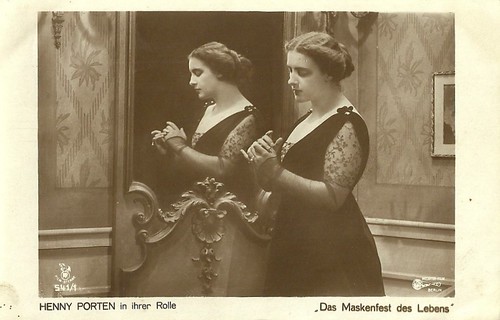
German postcard byRotophot in the Film-Sterne series, no. 541/1. Photo: Messter-Film, Berlin. Henny Porten in Das Maskenfest des Lebens (Rudolf Biebrach, 1918).
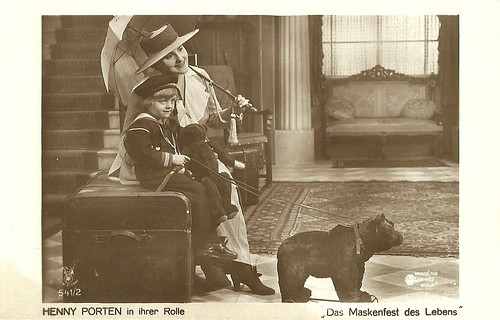
German postcard in the Film Sterne series by Rotophot, no. 541/2. Photo: Messter-Film. Henny Porten and Walfried Mellin in Das Maskenfest des Lebens (Rudolf Biebrach 1918).
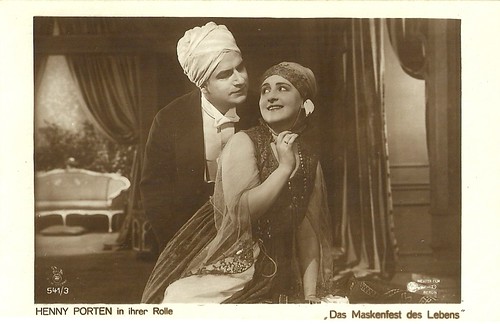
German postcard in the Film Sterne series by Rotophot, no. 541/3. Photo: Messter-Film. Henny Porten and Bruno Decarli in Das Maskenfest des Lebens (Rudolf Biebrach 1918).
In Das Maskenfest des Lebens/The Masquerade of Life (Rudolf Biebrach, 1918), Henny Porten plays Jolanthe von Brissac, the lady-in-waiting of a Grand Duchess (Olga Engl). She wants Jolanthe to marry Count Falken (Ernst Wendt), although Jolanthe does not love him.
After a short marriage, the count dies when deadly injured in a hunt. A little later Jolanthe gets to know another man during a dance, who does not show himself, since he is wearing a mask at that time.
Jolanthe is fascinated by this mysterious stranger, invites him to a cup of tea and finally gives herself to him. She does not suspect that the mysterious stranger is doctor Wolfgang Sanders (Bruno Decarli).
As a result of this one-night stand, a child is born. Jolanthe's son is four years old when he becomes seriously ill one day. Worried, his mother immediately calls a doctor to look after her little Rolf (Walfried Mellin) and save his life. Only now does Jolanthe realise that the doctor is her great love and at the same time the father of her child. Happy end.
The script by Wilhelm Roelinghoff was liberally based on a novel by Honoré de Balzac. Das Maskenfest des Lebens passed censorship in August 1918 and premiered on 30 August 1918 in the cinema Mozartsaal in Berlin. The film had four acts and originally was 1440 meters long, with 75 subtitles. It was banned to youngsters.
In a new censorship in May 1921, the film was cut down to 1213 meters. In the Austrian Paimann’s Filmlisten the film was marked as "Stoff sehr gut, Photos und Szenerie ausgezeichnet." (Subject very good, cinematography and scenery outstanding). Cinematography was by Karl Freund, the later camera wizard of German Expressionist cinema, and the sets were designed by Ludwig Kainer and Jack Winter.
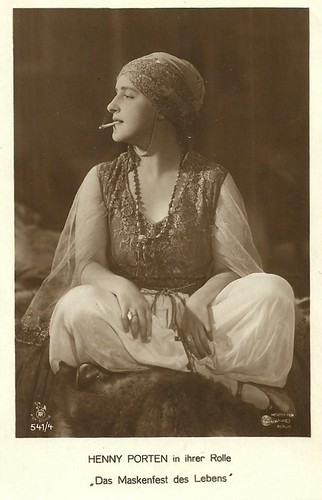
German postcard in the Film Sterne series by Rotophot, no. 541/4. Photo: Messter-Film. Henny Porten in Das Maskenfest des Lebens (Rudolf Biebrach 1918).
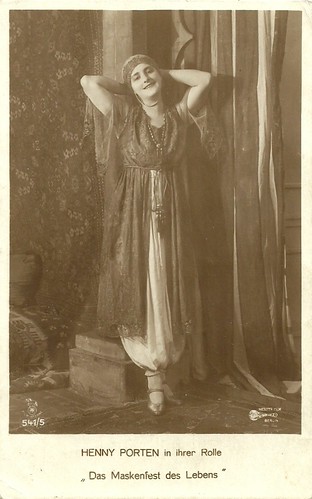
German postcard in the Film Sterne series by Rotophot, no. 541/5. Photo: Messter-Film. Henny Porten in Das Maskenfest des Lebens (Rudolf Biebrach 1918).
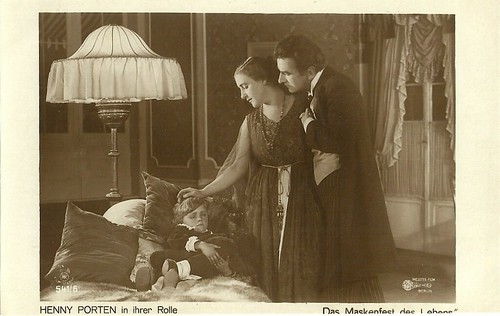
German postcard in the Film Sterne series by Rotophot, no. 541/6. Photo: Messter-Film. Henny Porten, Bruno Decarli and Walfried Mellin in Das Maskenfest des Lebens (Rudolf Biebrach 1918).
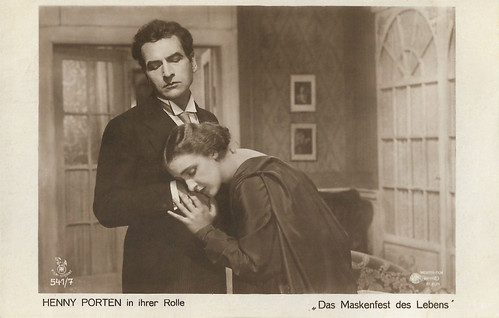
German postcard by Rotophot in the Film-Sterne series, no. 541/7. Photo: Messter-Film. Henny Porten in Das Maskenfest des Lebens (Rudolf Biebrach, 1918).
Source: Filmportal.de, The German Early Cinema Database, Wikipedia (German) and IMDb.

German postcard byRotophot in the Film-Sterne series, no. 541/1. Photo: Messter-Film, Berlin. Henny Porten in Das Maskenfest des Lebens (Rudolf Biebrach, 1918).

German postcard in the Film Sterne series by Rotophot, no. 541/2. Photo: Messter-Film. Henny Porten and Walfried Mellin in Das Maskenfest des Lebens (Rudolf Biebrach 1918).

German postcard in the Film Sterne series by Rotophot, no. 541/3. Photo: Messter-Film. Henny Porten and Bruno Decarli in Das Maskenfest des Lebens (Rudolf Biebrach 1918).
A Mysterious Stranger
In Das Maskenfest des Lebens/The Masquerade of Life (Rudolf Biebrach, 1918), Henny Porten plays Jolanthe von Brissac, the lady-in-waiting of a Grand Duchess (Olga Engl). She wants Jolanthe to marry Count Falken (Ernst Wendt), although Jolanthe does not love him.
After a short marriage, the count dies when deadly injured in a hunt. A little later Jolanthe gets to know another man during a dance, who does not show himself, since he is wearing a mask at that time.
Jolanthe is fascinated by this mysterious stranger, invites him to a cup of tea and finally gives herself to him. She does not suspect that the mysterious stranger is doctor Wolfgang Sanders (Bruno Decarli).
As a result of this one-night stand, a child is born. Jolanthe's son is four years old when he becomes seriously ill one day. Worried, his mother immediately calls a doctor to look after her little Rolf (Walfried Mellin) and save his life. Only now does Jolanthe realise that the doctor is her great love and at the same time the father of her child. Happy end.
The script by Wilhelm Roelinghoff was liberally based on a novel by Honoré de Balzac. Das Maskenfest des Lebens passed censorship in August 1918 and premiered on 30 August 1918 in the cinema Mozartsaal in Berlin. The film had four acts and originally was 1440 meters long, with 75 subtitles. It was banned to youngsters.
In a new censorship in May 1921, the film was cut down to 1213 meters. In the Austrian Paimann’s Filmlisten the film was marked as "Stoff sehr gut, Photos und Szenerie ausgezeichnet." (Subject very good, cinematography and scenery outstanding). Cinematography was by Karl Freund, the later camera wizard of German Expressionist cinema, and the sets were designed by Ludwig Kainer and Jack Winter.

German postcard in the Film Sterne series by Rotophot, no. 541/4. Photo: Messter-Film. Henny Porten in Das Maskenfest des Lebens (Rudolf Biebrach 1918).

German postcard in the Film Sterne series by Rotophot, no. 541/5. Photo: Messter-Film. Henny Porten in Das Maskenfest des Lebens (Rudolf Biebrach 1918).

German postcard in the Film Sterne series by Rotophot, no. 541/6. Photo: Messter-Film. Henny Porten, Bruno Decarli and Walfried Mellin in Das Maskenfest des Lebens (Rudolf Biebrach 1918).

German postcard by Rotophot in the Film-Sterne series, no. 541/7. Photo: Messter-Film. Henny Porten in Das Maskenfest des Lebens (Rudolf Biebrach, 1918).
Source: Filmportal.de, The German Early Cinema Database, Wikipedia (German) and IMDb.
No comments:
Post a Comment